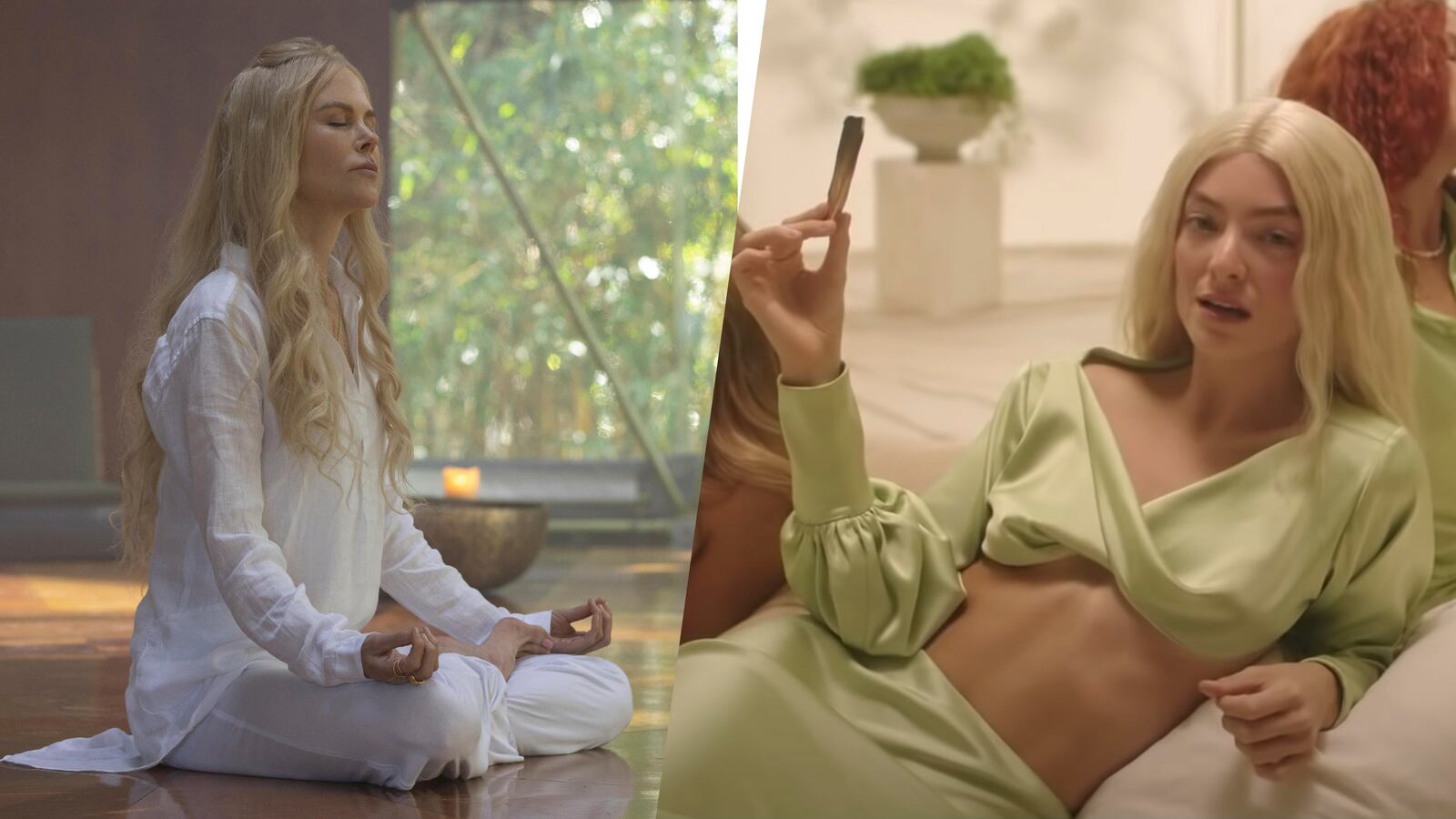On Wednesday, Hulu dropped the first three episodes of its most star-studded scripted series to date, David E. Kelley’s adaptation of Liane Moriarty’s bestselling novel Nine Perfect Strangers. Directed by Jonathan Levine and co-produced by Nicole Kidman, the limited series takes place in an exclusive wellness retreat where the titular guests attempt to undergo some spiritual and physical transformation, guided by a sketchy Russian guru named Masha, played by Kidman in yet another distracting wig.
As Kevin Fallon opined in his review, the series is a tonal mishmash. Despite some performances that would otherwise attract immediate awards buzz if placed in a better show, notably from Melissa McCarthy and Michael Shannon, none of them really coalesce to create a dynamic ensemble. Nor do any of these broadly written characters or the evidently fraudulent institution warrant that much intrigue. On a marketing level, the series also faces the burden of competing with the hype of HBO’s just-concluded smash hit The White Lotus, which also portrays rich people swapping their privileged at-home lives for another privileged experience in an exotic location, and Kelley’s previous Moriarty adaptation Big Little Lies, where his pen is far more robust.
Whether or not Nine Perfect Strangers attracts the fanfare it’s clamoring for with its cast of A-listers, its presence in the zeitgeist, and wonky, cult-ish portrayal of the wellness industry, along with other new media, feels indicative of a growing exhaustion and cynicism surrounding the state of self-care and wellness, particularly the ways it’s manifested in American life just over the past few years, from social media to QAnon conspiracies to corporate advertising and, of course, the current pandemic.
Wellness—encompassing holistic practices and dubious remedies—is hardly a new phenomenon in the United States, although it feels like it’s become ubiquitous over the past decade. Since colonialism, the Western world has been importing and appropriating Eastern methods of medicine and spiritual practices that are now associated with catchall terms like “New Age,” “alternative medicine,” and even “Goop.” Self-care as a rationalization for incorporating wellness and self-improvement into our lives also has a deeper history than the average Instagram user inundated with #selfcare sponcon would be led to believe, promoted by ancient philosophers and repopularized in political environments like the women’s liberation movement of the ’70s and, specifically, queer Black feminist spaces. (This is why writer and activist Audre Lorde’s definition of the term is often referenced on the feminist sections of the internet.)
Now more than ever, these practices and their philosophies have been detached from their histories, stripped of their nuances and monetized by corporations and upper-class white people—but most visibly in pop culture, upper-class white women. In a piece for The New Yorker, Jordan Kisner writes about the “#selfcare-as-politics movement of 2016” that was ironically “powered by straight, affluent white women” in response to Donald Trump’s presidential campaign and subsequent election, a moment that awakened much of that demographic politically. Likewise, the rich white woman who collects crystals, receives sound baths and is obsessed with tarot cards and, most significantly, considers herself an expert in these customs has captured our collective attention and skepticism, from Gwyneth Paltrow and her Goop empire, Kourtney Kardashian’s try at her own Goop, shows like the aforementioned Nine Perfect Strangers and Fox’s Fantasy Island (although the rich woman is Latina).
Lorde has taken on this archetype in her new music, particularly the music video to her latest single “Mood Ring,” which dropped on Wednesday ahead of the release of new album Solar Power. It captures Lorde, ironically—but maybe not so ironically—donning a blonde wig like Kidman’s Masha, and a group of women in jade green performing sun salutations, turning through old, spiritual texts, and playing with crystals while the 24-year-old croons about “tryna to get well on the inside.” This lifestyle has been so readily adopted by her ilk, particularly people in the entertainment industry, that one might miss the satirical tone in these lyrics. In her newsletter, the musician explained that the song is “satire” and that the narrator is fictional, although she admits that she occasionally succumbs to “magical thinking” when she “need[s] to believe in something to feel good and clear.”
While Lorde lacks a strong rebuttal to the Gwyneth Paltrow figure—maybe because it’s too close to home— the singer’s analysis of wellness culture and its misappropriations feels sharper when aimed toward men. On the Solar Power song “Dominoes,” she lambasts the specific type of man who takes on gardening, weed, and yoga to rebrand from his toxicity and misogyny. “It must feel good to be Mr. Start Again,” she sings caustically. The song cleverly illustrates how goodness is often ascribed to men who associate themselves with activities that are deemed feminine within our culture. But it also gets at the way self-improvement can easily be utilized as a Band-Aid or a facade in place of doing the actual work.
As culture becomes more and more desperate for healing, whether from political divisions, as our president constantly suggests, or literal life-threatening diseases like COVID-19, the space between community and cult, non-traditional medicine and pseudoscience, self-care and individualism seems to be capturing our artistic imaginations at an extremely vital time. How can the roots of wellness be reclaimed and reasserted when it’s become a $4.4 trillion money grab and employed for the most dangerous political agendas? Lorde’s Solar Power and Nine Perfect Strangers may not be perfect articulations of these quandaries, but they show how much there is to mine in that danger zone.


